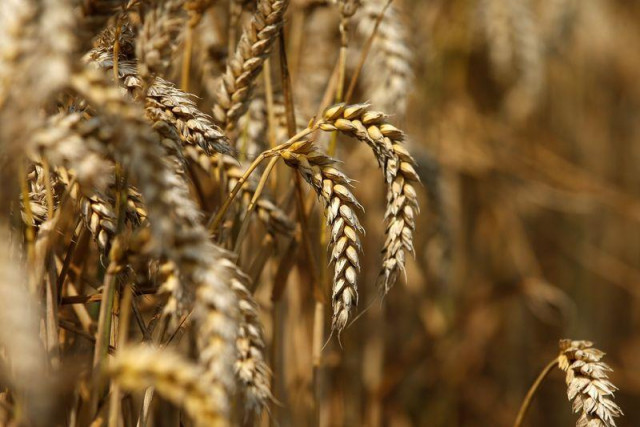Pakistan may miss wheat targets in ongoing season
Excessive rains, attack of yellow leaf rust virus cause some losses

Pakistan may miss wheat targets in ongoing season
“Excessive rains and the attack of yellow leaf rust virus on the staple wheat crop in some parts of Punjab (whose share in total production stands at 70%) may have initially caused some losses,” said a Ministry of National Food Security and Research official while talking to The Express Tribune.
The government’s Federal Committee on Agriculture (FCA) had set a production target of 27.03 million tons from 9.2 hectares (22.73 million acres) in 2020.
“Overall, 2020 wheat production is expected to remain close to the five-year average (25.38 million tons), but below previous expectation of a bumper output,” Food and Agriculture Organisation (FAO) of the United Nations said on its official website the other day. The average production stands close to the total annual requirement for the grain in the country.
Agriculture Forum of Pakistan (AFP) Chairman Ibrahim Mughal said it seems impossible to achieve the production target of 27 million tons of wheat this year as farmers sowed seeds over around 21 million acres only against the target of 22.73 million acres from October 2019 to February 2020.
“The high cost of production, including higher fertiliser prices, and a low support price (minimum purchase price of wheat set by the government at Rs35 per kg for the current year) did not allow farmers to sow seeds on a larger area,” he said.
FAO said in March-April, unseasonal heavy rains and localised hail over areas of the main wheat-producing province of Punjab, delayed harvesting operations had caused localised damage to standing crops. Above-average rains raise concerns over the worsening of the desert locust outbreak, which has been present in the county since the beginning of 2019.
“The abundant rains in March/April improved vegetation conditions that, together with warm temperatures in April, could support locust breeding, with an increase in locust numbers that may damage late-planted wheat crops still to be harvested,” it said.
The 2020 wheat season had started on time last October and progressed well until February. During this period, favourable weather conditions, ample irrigation water supplies and adequate availability of agricultural inputs, such as fertilisers, chemicals, and labour, allowed farmers to plant an above-average area and had fostered expectations for bumper yields this year, it said. Last year (2019), wheat production dropped around 2.5% to 24.47 million tons compared to 25.10 million tons in the prior year of 2018. The government had set a production target of 25.6 million ton for 2019.
Moreover, the procurement was 35% (2.5 million tons) less than the target of around seven million tons by Pakistan Agricultural Storage and Services Corporation (Passco) and four provincial food departments.
The low production, low procurement and low carryover stocks from previous years had triggered the wheat and flour pricing crisis in December 2019 and January 2020 when flour price soared by Rs15 per kg to around Rs60 in retail in Karachi and other parts of the country.
Procurement
It is assumed there are little or no carryover stocks available this year from the previous years, while Passco and provincial food departments may not achieve the set procurement target of a cumulative seven million tons this year as well.
“The government is procuring wheat at Rs35/kg from farmers compared to higher price being offered by traders in the private sector,” Mughal said.“The government of Punjab is procuring the grain through invoking section 144 (which bans movement of the grain by the private sector) to ensure it meets the set target,” he said.
The same wheat is being sold at Rs40/kg in wholesale and the whole-wheat flour at Rs60/kg in Karachi and other parts of the country, he said.
Another official at the ministry said such issues were not there in Sindh (whose share stands at around 14%) and the province is estimated to achieve bumper crop. “Provinces have delayed submitting initial production reports by over one-month due to the coronavirus. They were scheduled to file the reports on April 1.”
Published in The Express Tribune, May 7th, 2020.
Like Business on Facebook, follow @TribuneBiz on Twitter to stay informed and join in the conversation.



















COMMENTS
Comments are moderated and generally will be posted if they are on-topic and not abusive.
For more information, please see our Comments FAQ